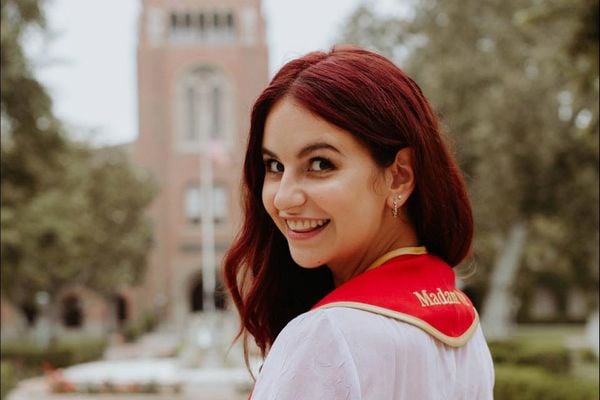Rose Ritch resigned as vice president of the University of Southern California Undergraduate Student Government after facing impeachment proceedings and harassment over her support for Israel.
By Dion J. Pierre, The Algemeiner
The U.S. Department of Education is formally investigating allegations that the University of Southern California (USC) did not do enough to stop a “concerted campaign of antisemitic harassment” that drove a former student out of an undergraduate student government body.
The Office of Civil Rights (OCR) probe was launched in June following a 2020 complaint by the Louis D. Brandeis Center for Human Rights Under Law over the case of Rose Ritch, who resigned as vice president of the USC Undergraduate Student Government (USG) after facing impeachment proceedings and harassment over her support for Israel.
The alleged abuse began during Ritch’s candidacy for USG office, when her campaign posters and that of other Jewish candidates’ were vandalized, the complaint said.
It continued after she took office, with USC students demanding her resignation due to her identity as a Zionist, including via a social media campaign to “impeach [her] Zionist a**.”
“Although USC was aware of the discriminatory harassment against Ms. Ritch and the hostile environment it fostered, the University failed to take prompt and effective steps to end the harassment or eliminate the hostile environment,” said the complaint.
Ritch told The Algemeiner on Monday that she is “very grateful that after two years OCR is opening up this investigation.”
“What happened was very frustrating, upsetting, and difficult to go through as a student,” she said. “When this happened to me, I was contacted by many people sharing stories about similar incidents that were occurring at the same time or had happened twenty years ago on their college campuses.”
“I also know that since this happened in the summer of 2020 it’s continuing to be a significant issue, so I’m grateful that it’s moving in this direction and hope this isn’t something students have to deal with in the future,” she added.
At the time, Ritch’s cause drew broad support from national Jewish organizations, as well as a group of 43 USC faculty who issued a letter deploring the associations of Zionism with “racism, colonialism, and white supremacy” that had underpinned the accusations against her.
The Alliance for Academic Freedom, a group of progressive academics, also weighed in, noting that Ritch “is far from the only college student who has been harassed in recent years for their pro-Israel politics.”
Being blamed for the Israeli government’s actions
The campaign against Ritch included shocking attacks on social media blaming her for actions of the Israeli government, with one student posting, “Rose should be impeached too! Just as complicit and also a Zionist. The IDF [Israel Defense Forces] trains LAPD [Los Angeles Police Department] so it’s all connected.”
Another said, “warms my heart to see al [sic] the zionists from USC and USG getting relentlessly cyberbullied,” the complaint said.
Ritch told The Algemeiner that the university did nothing to stop the onslaught, staying quiet even when USG scheduled her impeachment trial.
That development prompted the involvement of the Brandeis Center, a legal advocacy group, which urged school officials to apply the Civil Rights Act and protect her from harassment intended to “deny her an equal educational opportunity to serve in USG” because she is Jewish, according to the complaint.
University officials did ultimately suspend Ritch’s impeachment, but the Brandeis Center argued that USC’s communications about the episode did not “specifically mention Ms. Ritch or the antisemitic harassment that targeted her” until she was pressed to resign from student government.
“USC failed to intervene; failed to speak out publicly in support of Ms. Ritch; failed to condemn or even acknowledge the harassment that targeted her; and failed to void the baseless impeachment complaint filed against her,” the complaint, filed by Brandeis Center president Alyza D. Lewin and Director of Legal Initiatives Denise Katz-Prober said.
“Through its silence and inaction, the University tolerated the discriminatory harassment directed at Ms. Ritch, thus emboldening it and leaving Ms. Ritch vulnerable to the negative effects of the hostile environment that the harassment created at USC,” it added.
The complaint asked OCR to require USC to prevent the future harassment of Jewish students and ensure their inclusion in all aspects of university life, and adopt the International Holocaust Remembrance Alliance (IHRA) Working Definition of antisemitism, which cites examples that include holding Jews responsible for actions of the state of Israel.
‘Universities should be safe and inclusive spaces’
In a statement on Tuesday, USC said it “is proud of its culture of inclusivity for all students, including members of our Jewish community.”
“USC over the last two years has made a number of commitments to combat antisemitism and anti-Jewish hatred,” the university said, pointing to partnerships with national Jewish groups and its Stronger Than Hate initiative, among other steps.
“We are continuing to take these steps to further build on the welcoming environment we have created for our Jewish community,” it continued. “We look forward to addressing any concerns or questions by the U.S. Department of Education regarding this matter.”
Commenting on the news of the inquiry, Jewish Federation of Greater Los Angeles CEO Rabbi Noah Farkas said Monday that “universities should be safe and inclusive spaces,” and pledged to work with the school administration and campus Jewish groups to “ensure that Jewish students at USC can thrive and live their fullest Jewish life free of any hate or bias.”





